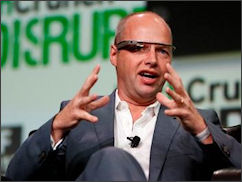
MOOC pioneer Sebastian Thrun. I’d feel a lot better about MOOCs if he took off those uber-geeky Apple computer-glasses.
Not unexpectedly, after two years experience, the purveyors of Massively Open Online Courses (MOOCs) are re-evaluating their model for delivering educational services, according to the New York Times. It turns out that the jaw-breaking numbers of students enrolled in some MOOC courses — 160,000 in the case of on Stanford University professor’s course on artificial intelligence — really are too good to be true. A recent study of MOOCs indicates that only half of enrollees actually viewed a lecture, and only 4% completed a course. In a highly touted program at San Jose State, evidence suggests that students taking classes online performed worse than their peers in traditional classrooms.
Some critics of online learning no doubt will seize on these findings to crow about the superiority of the status quo. But they would do well to heed this line in the article: “Even the loudest critics of MOOCs do not expect them to fade away. More likely, they will morph into many different shapes.”
“It’s like, ‘The MOOC is dead, long live the MOOC,’ ” said Jonathan Rees, a Colorado State University-Pueblo professor who has expressed fears that the online courses would displace professors and be an excuse for cuts in funding. “At the beginning everybody talked about MOOCs being entirely online, but now we’re seeing lots of things that fall in the middle, and even I see the appeal of that.”
It’s been clear for some time, actually, that so-called “hybrid” learning, combining elements of online and face-to-face learning, may be the way forward. The experimentation and tinkering continues. “We’re moving from the hype to the implementation,” said MOOC pioneer George Siemens, who convened a meeting last week to discuss results. “It’s exciting to see universities saying, ‘Fine, you woke us up,’ and beginning to grapple with how the Internet can change the university.'”


